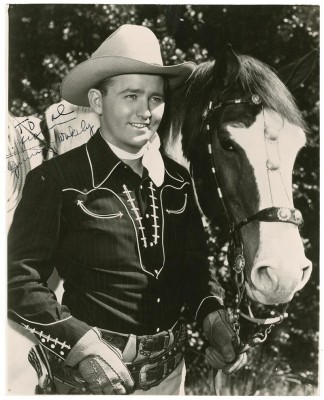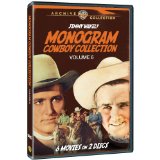| Reviews & Columns |
|
Reviews DVD TV on DVD Blu-ray 4K UHD International DVDs In Theaters Reviews by Studio Video Games Features Collector Series DVDs Easter Egg Database Interviews DVD Talk Radio Feature Articles Columns Anime Talk DVD Savant Horror DVDs The M.O.D. Squad Art House HD Talk Silent DVD
|
DVD Talk Forum |
|
|
| Resources |
|
DVD Price Search Customer Service #'s RCE Info Links |
|
Columns
|
|
|
Monogram Cowboy Collection, Volume 6 - Jimmy Wakely
The Monogram film library seems to have been in a state of considerable disarray for some time. Many of its films are in the public domain, and what original film elements do survive typically aren't in the best shape, and even here the pickings are slim. Further complicating matters is that Monogram's film library is officially divided among three corporate entities. Warner Bros. owns most of the Monogram collection from the 1930s through the early ‘50s (when the company changed its name to Allied Artists), and all of the subsequent Allied Artists titles whose rights haven't reverted back to their original producers. However, MGM owns more than a hundred Monogram films, while other Monogram titles sold long ago to National Telefilm Associates (NTA) now reside at Paramount.
The first two titles in this set are remakes. Riders of the Dawn, which under the title Riding the Dusty Trail bears the Associated Artists' TV distributor's credit* was, incredibly, the fourth version of the same story in as many years. Originally a Monogram "Range Busters" entry called Trailing Double Trouble (1940) and starring Ray "Crash" Corrigan, John "Dusty" King, and Max Terhune (and thus an imitation "Three Mesquiteers" movie to boot), the same story was filmed again in 1941 and 1944. The Gunman from Bodie was yet another Monogram-produced derivative of Republic's Three Mesquiteers, this time with Buck Jones, Tim McCoy, and Raymond Hatton, while Gunsmoke Mesa offered the less-remembered Texas Rangers teaming of James Newill, Dave O'Brien, and Guy Wilkerson.
The early Jimmy Wakely series features, two of which are included in this set, attempt a similar triumvirate. In both Riders of the Dawn and Lonesome Trail, Jimmy is teamed with John James as Dusty (replacing Dennis Moore, who had played a similar character named as Denny), the handsome Ray Corrigan-type second lead. Lee "Lasses" White plays himself, the Gabby Hayes/Raymond Hatton/Max Terhune-type sidekick.
Though remakes, I didn't notice any obvious use of stock footage from the earlier films and suspect Monogram just recycled these old scripts as a matter of thrifty convenience.
Comical sidekicks were a dime a dozen in the forties and few measured up to the great Gabby Hayes's often hilarious irascibility. Lasses, Jimmy's sidekick in the first dozen Wakely movies, is memorable if forgotten by all but the hardcore B-Western buffs. A former minstrel show performer and songwriter (likening him to Smiley Burnette in the latter case) he enjoyed a four-year stint on the Grand Ole Opry before the saucer-eyed sidekick got into movies later in life, when he was already pushing 50. He landed a recurring role as "Whopper" in a handful of Tim Holt Westerns made at RKO (replacing Emmett Lynn, who had a similar look) before joining the Jimmy Wakely unit at Monogram. There, Lasses was by all accounts much-loved by his cast- and crewmates.
Around 1947, Wakely was talked into replacing him with Dub Taylor, a decision Wakely later regretted. Lasses died two years later. Taylor, later the acclaimed Western character star best known for his roles in films like Bonnie and Clyde and as a member of director Sam Peckinpah's stock company of actors, was back in the ‘40s, a busy sidekick in lesser Bs. Dub's persona, "Cannonball," was rooted in a more physical style comedy, drawing on the actor's roots in Vaudeville, and in most of the films he also got to exhibit his considerable skills as a xylophone player. Taylor and Wakely had worked together before, in seven Charles Starrett Westerns for Columbia Pictures, so it probably seemed like a good match. However, Taylor's somewhat abrasive screen persona (put to better use in later films) was at odds with Wakely's singularly low-charm, and where Wakely and Lasses had a definite onscreen chemistry together, Taylor is pure comedy relief, off on the sidelines, with Jimmy merely tolerating his friend's foolishness.
Jimmy Wakely may have been Monogram's answer to Gene Autry, but Autry himself didn't seem to mind, as there seems to have been some cross-pollination of Autry influences and talent in the Wakely series, such as Brand of Fear's leading lady: Gail Davis (later TV's Annie Oakley), Autry's mistress for many years.
The plots are old chestnuts, tired stock stories seen in hundreds of other B-Westerns: stolen land grants, a respected marshal whose secret past is used against him, ex-Texas Rangers vs. corrupt Texas State Police, etc. Wakely made four to nine of these movies every year during the second half of the 1940s. Though made fast and cheap, in the hands of veteran helmers like Derwin Abrahams, Lambert Hillyer, and Oliver Drake, they are more polished than other Poverty Row Westerns.
However, the music, not impacted by budgetary constraints, is first-rate, as good as the kind of thing one might find in top-tier A-Westerns. The music consists of new material (often written by Wakely) and old standards ("Cool Water") often written by Jimmie Rodgers. Wakely, to his credit, also seems to have been quite a generous performer. In nearly all of his films each of his supporting musicians (including The Pickard Band, The Sunshine Girls, etc.) is accorded a solo to show off his or her particular talent. Some of these fiddlers (e.g., Arthur "Fiddlin'" Smith), harmonica players, etc. really dazzle. The later films suffer because there's less music, and the various elements â€" the B-Western plot, the comedy relief, the singing â€" are so obviously compartmentalized.
Video & Audio
As a rule, the six features in this two-disc set consist of good transfers of weaker film elements. Compared to MGM and Warner Bros. movies released under the Warner Archive label, the Monogram movies tend to be softer, muddier, and darker, though these official releases are still light years ahead of what these same movies looked like under various public domain labels. All six are certainly acceptable even on big screen TVs, and fans of this kind of film should be pleased. The Dolby Digital mono audio (English only, no subtitles) is acceptable and the discs are region-free. No Extra Features.
Parting Thoughts
An acquired taste (even fans of low-budget Westerns tend to be divided between those who prefer or dislike singing cowboy movies, and Monogram's Jimmy Wakely series hardly finds this sub-genre at its peak), but the movies are still quite enjoyable on several levels, and I'm delighted to see them get the respectful treatment they deserve. Recommended.
* Lonesome Trail bears the name of yet another reissue or television distributor, Monarch.
Stuart Galbraith IV is a Kyoto-based film historian whose work includes film history books, DVD and Blu-ray audio commentaries and special features. Visit Stuart's Cine Blogarama here.
|
| Popular Reviews |
| Sponsored Links |
|
|
| Sponsored Links |
|
|
| Release List | Reviews | Shop | Newsletter | Forum | DVD Giveaways | Blu-Ray | Advertise |
|
Copyright 2024 DVDTalk.com All Rights Reserved. Legal Info, Privacy Policy, Terms of Use,
Manage Preferences,
Your Privacy Choices | |||||||














